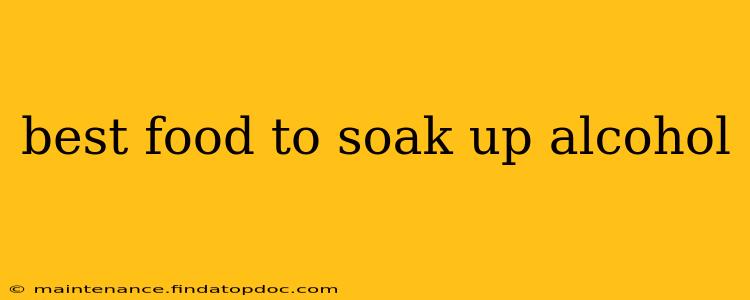Feeling the effects of a little too much alcohol? Knowing what to eat can significantly ease the unpleasant symptoms of a hangover. While no food can magically reverse intoxication, certain foods can help your body process alcohol more efficiently and alleviate some of the common hangover woes. This guide explores the best foods to soak up alcohol, focusing on their nutritional properties and how they help.
What are the best foods to eat when you've had too much to drink?
This is a frequently asked question, and the answer isn't a single magic bullet. The best approach is a combination of foods that replenish lost nutrients and soothe your stomach. Foods rich in carbohydrates, electrolytes, and vitamins are particularly beneficial. We'll dive deeper into specific food choices below.
What foods help with a hangover?
Many foods can contribute to hangover relief. The key is to focus on replenishing what alcohol depletes: fluids, electrolytes, and essential nutrients. Foods high in these components are your best bet.
What foods absorb alcohol?
It's important to clarify that no food absorbs alcohol in the way that a sponge absorbs water. Alcohol is processed by your liver, and nothing can speed up that process significantly. However, certain foods can help mitigate the negative effects of alcohol consumption by supporting your body's natural detoxification processes.
What are the best foods to eat after drinking?
After a night of drinking, prioritize foods that are easy on your stomach and provide essential nutrients. This often means avoiding greasy or overly spicy foods. Instead, focus on:
1. Complex Carbohydrates:
- Why they help: Complex carbs provide sustained energy, helping to combat the fatigue and low blood sugar often associated with alcohol consumption.
- Examples: Oatmeal, toast, whole-grain bread, bananas, rice.
2. Electrolyte-Rich Foods and Drinks:
- Why they help: Alcohol is a diuretic, leading to dehydration and electrolyte imbalance. Replenishing electrolytes like sodium, potassium, and magnesium is crucial.
- Examples: Broth (chicken or vegetable), bananas, coconut water, sports drinks (in moderation).
3. Foods High in B Vitamins:
- Why they help: Alcohol depletes B vitamins, which play a critical role in energy production and liver function.
- Examples: Leafy green vegetables (spinach, kale), eggs, lean meats, avocado.
4. Water (Plain and Simple):
- Why it helps: Dehydration is a major contributor to hangover symptoms. Water is essential for rehydration. Aim for plenty of water throughout the day following alcohol consumption.
Are there any foods to avoid after drinking?
While many foods can be beneficial, some are best avoided after a night of drinking:
- Greasy or Fried Foods: These can upset your already sensitive stomach.
- Spicy Foods: Similar to greasy foods, spices can exacerbate stomach irritation.
- Sugary Drinks and Sweets: While they might provide a temporary energy boost, they can lead to blood sugar crashes later.
- Processed Foods: These often lack essential nutrients and can contribute to feelings of malaise.
The Bottom Line: Nourishing Your Body After Alcohol Consumption
The best approach to mitigating the effects of alcohol involves a proactive strategy that combines plenty of water with a balanced intake of complex carbohydrates, electrolyte-rich foods, and foods rich in B vitamins. This holistic approach helps support your body's natural processes, leading to a more comfortable recovery. Remember, moderation is key when it comes to alcohol consumption. And if you're experiencing severe hangover symptoms, consult a medical professional.
